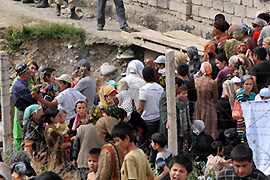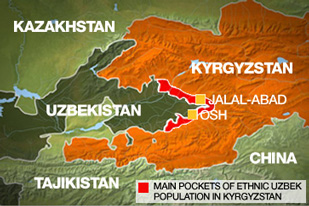UN urges halt to Kyrgyzstan clashes
UN says urgent need for aid as thousands of refugees flee deadly ethnic violence.

In his briefing, Pascoe called for the urgent creation of a humanitarian corridor for aid to be delivered in Kyrgyzstan, saying the UN was trying to help people affected by the violence and by shortages of food, water and electricity, especially in Osh.
| IN DEPTH | |||||||||||||||||||||||||||
|
“We talked about the need to get something in there right away to make it so we could get the humanitarian stuff through,” Pascoe told reporters after the meeting.
“It’s also a great concern of ours about the refugees – whether they can get across the border,” he added, referring to the Uzbekistan border to where thousands of ethnic Uzbeks have fled.
“What we are trying to do is get (Uzbekistan) enough assistance there that they can feel comfortable with additional refugees coming through.”
The United Nations refugee agency (UNHCR) said on Monday that more than 75,000 refugees had fled into Uzbekistan as a result of the violence, with thousands of others reportedly waiting on the Kyrgyz side of the border.
Yves Giovannoni, the head of the International Committee of the Red Cross in Central Asia, told Al Jazeera that most of those who had entered Uzbekistan were in urgent need of help.
“Some have relatives in Uzbekistan and can stay with them but most are in makeshift camps – parking lots, schools, industrial plants – and they urgently need support from the Uzbekistan authorities and international community,” he said.
Most of the fleeing were ethnic Uzbeks, but there were also reports of Tajiks flocking to the border.
The unrest started in the city of Osh on Thursday, with mobs of Kyrgyz men attacking ethnic Uzbeks and torching their houses.
Al Jazeera’s Robin Forestier-Walker, reporting from Osh, said the situation appeared to have calmed on Monday night following several days of unrest, but levels of fear remained high.
“We’ve heard sporadic shots ringing out earlier this evening but now it’s quiet in the city centre,” he said.
|
“It seems indiscriminate killings, including of children, and rapes have been taking place on the basis of ethnicity.” Navi Pillay, |
“But people on both sides of this increasing divide between the ethnic Uzbek community and the Kyrgyz community are absolutely terrified. People are ready and packed, ready to go at the first sign of trouble or danger.”
Witnesses and officials have repeatedly claimed that fighting had not erupted spontaneously between Kyrgyz and ethnic Uzbeks but had been organised by some third party.
Soronbai Jenbekov, the regional governor of Osh, told Al Jazeera: “There are still attempts by third parties to destroy peace between the two ethnic communities.
“But now everyone has realised this and we’re working together to stop them. Our forces haven’t yet shot any Uzbeks or Kyrgyz – even though both sides are armed.”
His comments came after fleeing ethnic Uzbeks accused Kyrgyz government forces of taking part in the mob violence.
Border appeal
On Monday Navi Pillay, the UN High Commissioner for Human Rights, urged both Uzbekistan and Tajikistan to “keep their borders open to anyone, irrespective of age or gender, who is in need of sanctuary.
 |
| Thousands of refugees have fled across the border into Uzbekistan [AFP] |
“It seems indiscriminate killings, including of children, and rapes have been taking place on the basis of ethnicity,” her office said in a statement.
Uzbekistan ordered its borders closed earlier on Monday, saying it could not receive more people.
“Today we will stop accepting refugees from the Kyrgyz side because we have no place to accommodate them and no capacity to cope with them,” Abdullah Aripov, the deputy prime minister, said.
The UNHCR said it was preparing to send aid and emergency teams to Uzbekistan.
Several planes arrived at Osh’s airport with tonnes of medical supplies from the World Health Organisation on Monday, after reports that stores have been looted and food supplies were scarce.
There have been claims that Kurmanbek Bakiyev, the deposed Kyrgyz president who now is exiled in Belarus, has been orchestrating a campaign of ethnic conflict in the provinces of Osh and Jalal’abad.
The interim government said on Monday it had arrested a “well-known person” suspected of stoking the violence, but gave no other details.
Suspects from Tajikistan, Afghanistan and Kyrgyzstan were also detained and claimed to have been hired by supporters of Bakiyev, Farid Niyazov, a government spokesman, said.
Arrest
Kenishbek Duishebayev, the Kyrgyz security chief, later said on television that Bakiyev’s younger son, Maxim, had been arrested in Britain when he flew into a Hampshire airport on a leased private plane.
|
|
Prosecutors, who placed him on an international wanted-list in May, alleged that companies he owned avoided almost $80m in taxes on aviation fuel sold to suppliers of a US air base in the country.
The United States called for a co-ordinated international response to the unrest.
Hillary Clinton, the secretary of state, had spoken with officials in the interim Kyrgyz government as well as some of the Central Asian country’s neighbours to discuss the unrest, Philip Crowley, the state department spokesman, said.
The Kyrgyz interim government has asked Russia to send troops to stabilise the situation in the south, but the Kremlin turned down the request.
Dmitry Medvedev, the Russian president, on Monday condemned the violence and said he had spoken Roza Otunbayeva, the interim president.
He said “tough” action must be taken to prevent further unrest and bloodshed.


